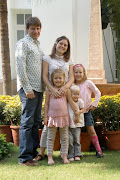Last week was, for me, a very literary week.
It started on Monday with a visit to Jamia Millia Islamia, the university next to our neighborhood. There’s a poetry club there that meets bi-weekly and attracts a varied group of poets, some students, some not. The purpose of the gathering is to facilitate and celebrate the public reading of original poetry. A man named Amit, a large and jolly poet from Haryana, organizes it and pastors the group with a gentle spirit.
This was my second time at the reading and the first time that I came ready to read my own poetry.
Upon arriving at the venue, however, I bumped into an elderly poet named Idrak Bhatty. I had met him a few months earlier when we were both attending the Mussoorie Writers Conference at Woodstock School. Today, I assumed that he was attending the same reading, maybe as a guest poet. He was not. But Mr. Bhatty was, in fact, launching his newest book of poetry in the building next door and he invited me to sit in for the event. I accepted the invitation, along with others from the poetry club, and we heard a couple long speeches and some good poetry, mostly in Urdu, read by some good readers, including the likes of film actor Tom Alter. I would have preferred to hear more poetry and less pomp and praise, but I still felt privileged to be there among the crowd and smiled to myself at how I had stumbled upon it. It was the first book launch I had ever attended.
Afterwards, the poetry club convened for a few rounds of reading. I read three of my poems. It was the first time I had ever performed my poetry in public. Amit was gentle and affirming. Others read also, providing me with much inspiration and stimulation. As several of us went out for coffee after, I further appreciated the depth of engagement with people who were willing and ready to reveal something more about themselves than just their names.
One result of this week’s encounter with the poetic was a new clarity about a certain aspect of the novel that is within me, and is slowly working itself out. With fresh inspiration, I began to write a poem that will hopefully appear in the novel itself.
More than that, I was also compelled to contact an elderly man living in Delhi who has inspired a character in the novel. Incidentally, he is the character who will, in the story, gift the main character with the aforementioned poem. In real life, his name is Kavi Singh and we also met at the Mussoorie Writers Conference back in October 2008.
I called Mr. Singh on Tuesday of last week and asked if we could perhaps meet on Friday. He was very friendly and willing. He suggested that I show up at the Delhi Golf Club at around 4pm when he usually would be finishing his round.
On Friday afternoon, I made my way over to the Golf Club, a prestigious Delhi landmark for generations and a most impressive patch of green in the very heart of the city. Kavi was finishing the ninth hole when I arrived. After we sat down for fresh lime sodas on the veranda, he asked whether I’d be willing to walk a few holes with him and talk as we went. I obliged without hesitation. As we walked, I also met Kavi’s golfing partner for the day, a strapping Sikh man named Balkar, a fascinating man in his own right who will perhaps soon require his own blog entry. After briefly hearing about my love for the Bible, Balkar was very eager to arrange a meeting when we could discuss Jesus’ pilgrimage to North India and the Hindu philosophy embedded in the Book of Revelation.
Kavi Singh has been involved in teaching, writing, editing and publishing for many years. He was born in 1931 and was in boarding school at Woodstock in Mussoorie from 1939 to 1947. At age 79 he still teaches English to children at a very unique school in Delhi called Mirambika. He is also an avid supporter of Woodstock and has fond memories about his time there. Kavi visits the Delhi Golf Club on a daily basis mostly to walk and socialize, but he still does at least a couple rounds of golf every week.
When Kavi and I met in Mussoorie some months ago, we made an instant connection and he struck me as a very interesting character. On the one evening of the conference we walked together and talked a lot about Woodstock, Mussoorie, and Delhi. Almost immediately I began to think not only about including these places in my novel but also about constructing a character in the likeness of my new friend. Slowly, the pieces began to fit themselves together in my mind.
Before Kavi and I parted ways last week, I told him about my novel and asked him if I could do a series of interviews with him to get acquainted with his story and the history of these places. He was delighted and we agreed to meet again soon.
On Saturday night, my literary week came to an end with another book launch, my second in six days. I had received this random email through a network that we’re a part of in Delhi. It’s a network of young parents called Delhi Babies. It usually provides information about playgroups and where to buy good diapers in the city. But sometimes people on the network who have lives beyond their kids post information about other events. This time a young dad named Rana Dasgupta announced the launch of his second novel, Solo, and he threw wide open the invitation to the party at the Park Hotel.
Amy wasn’t too interested in attending, so I invited a friend of mine who is a university professor. It was a very social event with far more people there than I expected. Every other book launch I’ve ever been to has had less than a hundred people in attendance, which was the case on Monday. There were probably over a thousand people at Saturday night’s event. Apparently, most of the crowd was a who's who of Delhi’s artists and media types, meaning lots of painters, writers and journalists. Most of the people there seemed to recognize most everyone else, or so it seemed to me. I didn’t know anyone there, except the friend who came with me, and one couple from the Canadian High Commission whom we know from the Canada Club. The three of them provided sufficient social interaction for me.
What I most enjoyed about the event was the talk by the author and his subsequent readings from the novel itself. Rana talked about the writing process and the research and the toll it all took on his family and personal life. He made it clear that it’s a mammoth task to write a novel and, by the sounds of the early response to Solo, it's probably pretty good. Though I didn’t give into the pressure to buy a copy that night, I may pick it up eventually at one of Delhi’s bookshops. First, I need to finish Tolstoy’s Anna Karenina, the literary masterpiece that sat unopened at my bedside during this entire literary week.



